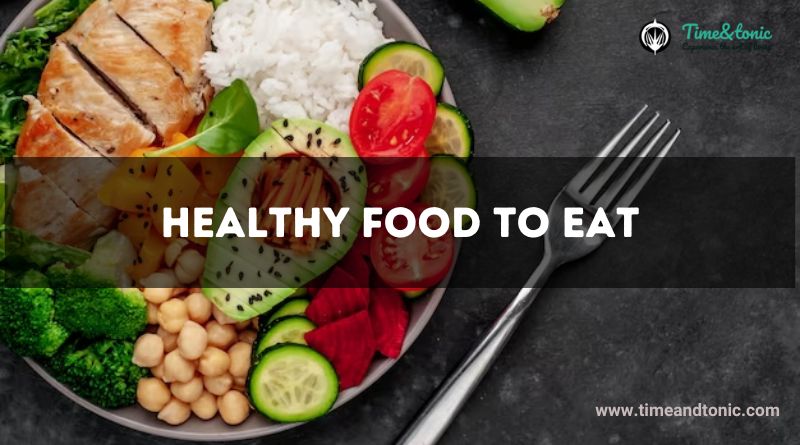Nourishing Choices with Healthy Food to Eat
Nourishing Choices with Healthy Food – In a world brimming with tantalizing fast-food options, sugary treats, and processed delights, the pursuit of wholesome living can sometimes feel like an uphill battle. Yet, in the realm of our everyday choices lies a potent secret — the power of healthy food to eat. This isn’t just about nibbling on salads and sipping green smoothies; it’s a profound journey that nourishes not just our bodies, but our minds and spirits too.
Welcome to our guide on unlocking the secrets of healthy food to eat, where we delve deep into the vibrant universe of nutrition, unearthing the gems of sustenance that can transform lives. This isn’t just another list of superfoods; it’s a comprehensive exploration of the art and science behind what we consume. In the following chapters, we will demystify the components of a balanced diet, explore the diverse range of food groups that fuel our bodies, and venture into the realms of mindful eating.
But why is this journey so important? It’s not just about shedding a few pounds or adhering to a passing trend. Healthy food is the cornerstone of a life well-lived. It fuels our ambitions, fortifies our immunity, and enhances our daily experiences. It’s about embracing vitality and savoring every moment with gusto, all the while understanding the profound impact our food choices have on the planet and the community around us.
We invite you to embark on this voyage with us, where we’ll navigate the aisles of the grocery store, explore the secrets of your kitchen, and uncover the joy of nourishing yourself and your loved ones. So, fasten your seatbelts and get ready to explore the world of healthy food to eat — a journey that promises not just a healthier you, but a happier, more vibrant life. Let’s dive in, one wholesome bite at a time.
Benefits of Healthy Eating
Embracing a balanced and nutritious diet offers a multitude of benefits that extend far beyond physical health. Here are some key advantages of healthy eating:
1. Enhanced Physical Health:
- Weight Management: A balanced diet helps in maintaining a healthy weight, reducing the risk of obesity and related diseases.
- Disease Prevention: Nutrient-rich foods lower the risk of chronic diseases such as heart disease, diabetes, and certain types of cancer.
- Strong Immune System: A person that is well-fed is better able to fight off sickness and infections.
Also Read: Nourishing Low Carb Dinners
2. Improved Mental Well-being:
- Better Mood: Certain nutrients, like omega-3 fatty acids, are linked to improved mood and reduced risk of depression.
- Increased Energy: Proper nutrition provides a steady supply of energy, preventing energy crashes and fatigue.
3. Cognitive Benefits:
- Sharper Brain Function: Healthy eating supports brain health, aiding in better concentration, memory, and overall cognitive function.
- Reduced Risk of Neurological Disorders: Certain nutrients, such as antioxidants and omega-3 fatty acids, may lower the risk of neurodegenerative disorders like Alzheimer’s disease.
4. Better Digestive Health:
- Improved Digestion: Fibre-rich foods promote healthy digestion and prevent constipation.
- Healthy Gut Flora: Probiotics found in some foods support a healthy balance of gut bacteria, enhancing digestion and nutrient absorption.
5. Quality Sleep:
- Regulated Sleep Patterns: Certain foods contain components that promote relaxation and regulate sleep hormones, leading to better sleep quality.
Also Read: Discover the Delight of Low Carb Midnight Snacks
Incorporating Healthy Food to Eat in Daily Diet
Incorporating healthy food into your daily diet is a transformative journey that begins with mindful choices and consistent habits. Here’s a comprehensive guide on how to seamlessly integrate nutritious options into your daily meals:
Start Your Day Right

Starting your day right is essential for setting a positive tone that can influence your energy levels, mood, and productivity throughout the day. Here are some effective strategies to kick-start your mornings on a healthy and invigorating note:
1. Wake Up Early:
- Aim to wake up early, allowing yourself enough time to ease into the day without feeling rushed.
2. Hydrate Your Body:
- Drink a glass of water to start the day. Your body becomes dehydrated during sleep, and rehydrating in the morning jumpstarts your metabolism and flushes out toxins.
Snack Smart
Snacking smart is a fundamental aspect of maintaining a healthy diet. By choosing nutritious and balanced snacks, you can satisfy your hunger, boost your energy, and support your overall well-being. Here are some tips for snacking smart:
1. Opt for Nutrient-Dense Snacks:
- Choose snacks that are rich in nutrients. Fresh fruits, vegetables, nuts, and whole grains are excellent choices. They give you fiber, good fats, vitamins, and minerals that your body needs.
2. Portion Control:
- Be mindful of portion sizes. Use small bowls or containers to control the amount you eat. Avoid mindlessly munching from a large bag, as it can lead to overeating.
Plan Balanced Meals

Planning balanced meals is essential for ensuring that you receive the right nutrients your body needs for optimal health. A balanced meal includes a mix of carbohydrates, proteins, healthy fats, vitamins, and minerals. Here’s a guide on how to plan balanced meals:
1. Divide Your Plate:
- Vegetables: Fill half of your plate with colourful vegetables. They have a lot of fiber, vitamins, and minerals and not many calories.
- Proteins: Allocate a quarter of your plate to lean proteins like chicken, fish, tofu, legumes, or beans.
- Whole Grains: Reserve the remaining quarter for whole grains such as brown rice, quinoa, whole wheat pasta, or whole grain bread.
- Healthy Fats: Include a small portion of healthy fats like avocados, nuts, seeds, or olive oil. Healthy fats are important for brain health and hormone regulation.
2. Include Lean Proteins:
- Choose lean sources of protein, such as poultry, fish, beans, lentils, tofu, and low-fat dairy products. These proteins are very important for making new cells and fixing old ones.
Opt for Whole Grains
Opting for whole grains is a smart choice for your overall health. Unlike refined grains, whole grains contain all parts of the grain kernel – the bran, germ, and endosperm. This means they are rich in nutrients, fibre, and antioxidants. Here’s why you should make whole grains a regular part of your diet and how to incorporate them into your meals:
Benefits of Whole Grains
1. Rich in Nutrients: Whole grains are excellent sources of essential nutrients, including B vitamins, iron, magnesium, and selenium. These nutrients are crucial for various bodily functions, such as energy production and immune support.
2. High in Fibre: Whole grains are high in dietary fibre, promoting healthy digestion and preventing constipation. Fibre also helps maintain stable blood sugar levels and can aid in weight management by providing a feeling of fullness.
Include Lean Proteins
Including lean proteins in your diet is essential for overall health, muscle repair, and maintaining a healthy weight. Unlike fatty cuts of meat, lean proteins provide the necessary nutrients without excessive saturated fats. Here’s why lean proteins are important and how to incorporate them into your meals:
Benefits of Lean Proteins:
1. Muscle Repair and Growth: Proteins are the building blocks of muscles. Consuming lean proteins after exercise aids in muscle repair and promotes muscle growth.
2. Satiety: Proteins help you feel full and satisfied, reducing overall calorie intake. This is especially helpful for those trying to manage their weight.
Healthy Fats
Healthy fats are an essential component of a balanced diet and are vital for various bodily functions. Unlike saturated and trans fats, which should be limited, healthy fats provide valuable nutrients and support overall well-being. Here’s why healthy fats are important and how to incorporate them into your diet:
Benefits of Healthy Fats:
1. Brain Health: Healthy fats, especially omega-3 fatty acids found in fatty fish, flaxseeds, and walnuts, are crucial for brain development and function. They support cognitive function and can help prevent age-related cognitive decline.
2. Heart Health: Monounsaturated and polyunsaturated fats, found in olive oil, avocados, nuts, and seeds, can lower bad cholesterol (LDL) levels and reduce the risk of heart disease. They also maintain healthy blood vessel function.
Plant-Based Dairy Alternatives

1. Almond Milk: Almond milk is low in calories and can be a good source of calcium and vitamin D if fortified. It’s a great dairy milk substitute in cereals, smoothies, and baking.
2. Soy Milk: Soy milk is high in protein and can be a good source of calcium and vitamin D if fortified. It’s a versatile option for both sweet and savory dishes.
3. Coconut Milk: Coconut milk is often used in cooking and baking. While it’s high in saturated fat, consuming it in moderation can add a rich flavor to curries, soups, and desserts.
4. Oat Milk: Oat milk is gaining popularity and is naturally sweet with a creamy texture. It’s a good source of fiber and can be used in coffee, cereal, and smoothies.
5. Cashew Milk: Cashew milk is creamy and versatile, often used in sauces, soups, and desserts. It’s lower in calories than cow’s milk and can be a suitable option for those looking to cut calories.
Also Read: 9 Best Grocery Store Finds
In the journey toward better health, embracing a balanced diet, rich in whole grains, lean proteins, healthy fats, and incorporating dairy or its alternatives, paves the way. This diverse approach ensures a well-rounded intake of essential nutrients, supporting physical well-being and vitality. Remember, moderation and mindful choices are the cornerstones of a healthy lifestyle. By making informed decisions about our food, we nurture our bodies, leading to a life of sustained energy, resilience, and overall well-being.
FAQs
Healthy eating supports overall well-being, boosts energy levels, strengthens the immune system, prevents chronic diseases, and promotes mental health and longevity.
Try adding fruits to your breakfast, having vegetable snacks, or incorporating them into soups, salads, and smoothies. Experiment with different cooking methods and recipes to find what you enjoy.




